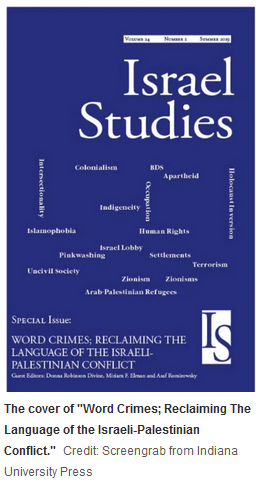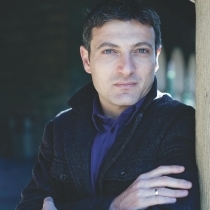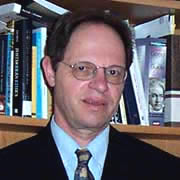 A recent Haaretz article discusses controversy over a special issue of the Israel Studies journal that criticizes terms such as occupation and genocide used to refer to Israel vis à vis the Palestinians, as well as references to the Israel Lobby and claims that criticism of Zionism is not to be equated with anti-Semitism:
A recent Haaretz article discusses controversy over a special issue of the Israel Studies journal that criticizes terms such as occupation and genocide used to refer to Israel vis à vis the Palestinians, as well as references to the Israel Lobby and claims that criticism of Zionism is not to be equated with anti-Semitism:
- Maltz, Judy. 2019. “War Breaks Out Among Israel Studies Scholars Over Journal Combating ‘Anti-Zionist Rhetoric.’” Haaretz, April 18, 2019. https://www.haaretz.com/us-news/.premium-war
The lead article by Donna Divine, “Word Crimes: Reclaiming The Language of The Israeli-Palestinian Conflict”, introduces the issue and is free on Jstor. (Unfortunately most of the specialist articles themselves have a price tag and I have not yet seen how or even if the issue itself is available for purchase at a reasonable cost.)

Matz’s Haaretz article quotes Max Ticktin Chair of Israel Studies at George Washington University, Arie M. Dubnov, claiming:
“the [journal’s] ‘alternative dictionary’ appears designed to provide talking points for anti-BDS and pro-‘hasbara’ efforts, and does not serve an academic purpose.”
The journal Israel Studies is “affiliated with” the Association for Israel Studies (Wikipedia article: Association for Israel Studies) but not that association’s official journal, according to information in the Haaretz article. Critics nonetheless hold the Association leadership responsible for the publication of the issue’s contents, and Dubnov in a letter demanded that the Association publish a retraction or cut their ties with the journal. (The association’s official journal is Israel Studies Review.)
Dubnov was further quoted as saying that the journal issue lent support for critics of Israel studies as a special field in academia as
an invented field that is nothing more than a cover for the Israeli Strategic Affairs Ministry.
Maltz adds,
He charged that the articles published in the journal “make a mockery of academic rules” and would never have passed muster in a serious academic publication.

Another academic, Gershon Shafir,
“This attempt to suppress critical voices and dissenting views within the [association] is a microcosm of the larger assault on liberal voices and institutions in Israel. . . .
“Ironically . . . the [association] itself was created with the aim of procuring a forum where Israel may be analyzed with the tools common to the social sciences and humanities, to free the study of Israel from the bonds of political loyalty and subservience in which it was enmeshed. That accomplishment, academic
autonomy, is threatened now by the repoliticization of the study of Israel through the criminalization of scholarship and assault on academic freedom.”

Another, Ian S. Lustick, oberves that
almost all the contributors to the ‘Word Crimes’ issue are members of Scholars for Peace in the Middle East — a straightout advocacy organization.

But a co-editor of the special issue, Miriam F. Elman, responded that such criticisms were “an ugly smear campaign” and certain demands of critics amounted to “academic thuggery”:
there will be no caving in to this bullying. I believe we are talking about a very small minority, as very few scholars would run roughshod over academic freedom in this way.”
So what’s in this special issue? As explained at the beginning I only have access to the lead article so I quote a few sections of that. You can make up your own minds, though I will not be able to resist a couple of mumbles of my own.
Excerpts from Donna Divine’s Word Crimes: Reclaiming The Language of The Israeli-Palestinian Conflict
(Not quite sure why I’m doing this. As I said at the outset anyone can read the whole article for free via Jstor. But for any lazy buggers who can’t be bothered here is my selection of hightlights.)
the Jewish state, today, stands accused of practicing apartheid, genocide, ethnic cleansing, and of sustaining itself as a remnant of an outdated and thoroughly delegitimized colonial order.
The language under criticism
identifies Israel not simply as a force hostile to Palestinian interests but also as a major source of evil for the world.
The term genocide
(Donna Divine’s essay also concludes with a discussion of the use of this term in the discussion.)
The United Nations definition of genocide:In the present Convention, genocide means any of the following acts committed with intent to destroy, in whole or in part, a national, ethnical, racial or religious group, as such:
- Killing members of the group;
- Causing serious bodily or mental harm to members of the group;
- Deliberately inflicting on the group conditions of life calculated to bring about its physical destruction in whole or in part;
- Imposing measures intended to prevent births within the group;
- Forcibly transferring children of the group to another group.
genocide is now defined as a Zionist impulse. A word that once engendered sympathy for Jews has been contaminated by becoming a rubric describing Israeli policies and a reason to fear Jewish power. . . . .
Think of “Deir Yassin”, the name for Palestinian suffering before the naqba. Millions of people across the globe know something of this village as the site of a massacre and the bonfire it made of Israel’s moral authority in waging its war for independence. . . . .
Tauber’s book [compare blog post] does not remove the stain of war crimes from the Irgun forces fighting in the village, but it does contest the scope of the brutality in that fateful attack in April 1948. Even to raise questions about whether a massacre occurred at Deir Yassin, however, is considered a transgression as Tauber learned from the several American university presses refusing to publish his book, one deeming it “unfit for English readers”. . . . it has had a profound impact on closing down the possibility of following the best available evidence.
From here the article segues into a discussion of Edward Said’s book Orientalism and merges with a discussion of …
The Israel lobby
To Said, imperialism was the great moral monstrosity . . .
The validity of an argument or claim would now depend more on who originates it than on whether it possesses evidentiary support. It did not take long for such cutting-edge academic trends to turn their fury against Israel . . . The media that denounces assaults on truth and reason incorporates what has become a vocabulary that has acquired the status of dogma, casting Israel as a country disposed to violence and bigotry. One obvious illustration is striking. The Walt/Mearsheimer book on the “Israel Lobby”, criticized for shoddy research when published, is now incorporated into articles as conventional wisdom—with all its rebutted arguments intact—dominating the way people talk and write about Israel. Renaming Israel has re-imagined Palestinian interests as part of a universal struggle to advance justice for people made victims by those wielding power.
I must consult some of the reviews of that book and compare with what I read in it.
Then we come to the vocabulary of
Human rights
The esteem bestowed on words and deeds associated with the Israeli-Palestinian Conflict is a function of their capacity not to promote peace, coexistence, or reconciliation but rather to signal affinity with a global progressive politics.
There follows a lengthy criticism of those who compare and relate the Palestinian cause with that of African-Americans. I know nothing about such comparisons so this is one section I cannot quote with any background knowledge so I move on.
We come then to a sub-heading, REVISIONIST SCHOLARSHIP.
The implication follows that Palestinian history cannot justifiably be reduced to a morality tale of good and evil.
Turning a presumed historical analysis into a morality tale of good and evil may shift public discourse, amplify its reach, or affect perhaps how even Israelis think about their country and imagine its future. But if it doesn’t fit Israel’s past or its development — nor explain why Palestinians have been victims of abuse in almost every jurisdiction in which they have lived — it should not be embraced in an academy upholding the standards normally set for scholarly work.
Arguments in favour of a Palestinian point of view appear to be deemed “without facts”, reduced to mere “personal opinion”:
Disrupting received wisdom is welcome as long as it results from examining the available facts. Academic work is not the same as political advocacy nor should a classroom become a staging ground for personal opinions or for expressing moral outrage.
Israel is unique, so goes the implication of the article, and any comparison with other situations in history or the contempary world are invalid:
Incorporating terms from global struggles for civil and human rights is calculated to sound an alarm about Israel . . . . the vocabulary delivers up a Jewish state that is, by its very nature, violent and racist.
The word occupation
We have a fascinating perspective here. I will try to refrain from comment, my selection of passages being comment enough, I hope:
1967 offered both Israelis and Palestinians the chance to redefine their respective relationships to their homeland and to one another. . . .
The War that administered such a blistering defeat to Egypt, Syria, and Jordan and tripled the size of Israel’s landmass, also gave the Jewish state responsibility for more than a million Palestinians living in the West Bank and Gaza Strip.
So the war placed upon Israel another Kipling-esque “white man’s burden”.
The Oslo Accords were intended to generate an agreement to resolve the many-layered Israel-Palestine disputes. Negotiations would determine the borders for two-states for two people, finding ways to share Jerusalem and bring relief and resolution to the refugee issue.
Sounds like Israel was bending over backwards to give the Palestinians everything they could reasonably want. But, but, but…. those damned, incorrigible Arabs again….
But discussions widened the gaps rather than bridged them as Palestinians proved reluctant to surrender their right of return and resistance while Israelis found it increasingly difficult to imagine a Jerusalem divided into two capitals or to withdraw from areas that could serve as launching pads for increasingly lethal attacks.
How unreasonable. Not giving up their right to go back home. Insisting on sharing the capital! And of course, the myth of 1967 being the war when the Arabs attacked Israel. Were the Palestinians at Oslo wanting to claim the territory from which Israel launched its attack on the Arabs?
And then one is meant to be reasonable and speak of a Palestinian occupation as an equally valid concept, presumably:
Yet talk of the Occupation with Israel the sole modifier persists in implying that the country, on its own, can bring it to an end despite tidal waves of terrorism unleashed by Palestinians. (my bolding)
“Tidal waves” unleashed by . . . Hamas? No. Islamic Jihad? No,…. “the Palestinians”. Much more could be said, but, I promised I’d try. But don’t “Palestinians” want to kill all Jews? So how is it that we read the following….
And while Palestinian and Israeli politicians confront each other as enemies or rivals, their populations ride together on buses or trains, shop in one another’s stores or markets, interacting as if such interactions are commonplace . . . .
Those Arabs are such easy targets for the psychological analysis of falling victim to their own “self-fulfilling prophecy”:
Believing they are denied agency by a power structure dominated by Israel becomes a self-fulfilling prophecy when the only response is one or another form of resistance . . . . Because Palestinians have incorporated the naqba as a core element of identity, they have found it impossible to separate history from memory.
Israel has a problem, too. The Palestinians aren’t the only ones in a quandary. Israel so fairly wants a two-state solution, of course, but, but, but….
Although most endorse the two-state principle, few see ways to apply it without endangering Israeli lives.
But what happened in the wake of the 1967 war is quite breathtaking in the words of Donna Divine:
1967 radically altered Israel’s relationship with its homeland. In the first months after the 1967 War, Israelis rushed to reconstitute communities destroyed in 1948. Some founded settlements in response to terror attacks. Moreover, the country’s postwar economic expansion enabled many Israelis — aided by government subsidies — to build their dream house and recast their culture from a celebration of a Spartan labor ideal into a nation that could offer more liberty to its citizens in their quest for material prosperity and for communities of like-minded families with the kinds of local services — religious or not – congruent with their life styles. The word settlement — once summoning up images of a return to the soil, to agricultural labor, and to a work imbued with an egalitarian ethic – became the incarnation of a new spirit of individualism taking over the society. And when the Israeli Government renamed the West Bank Judea and Samaria, stamping the territories with Biblical names, it invented a language to symbolize that the settlement mission was as Jewish as it was Zionist.
The settlement enterprise, then, is far more diverse and complicated than the standard settler colonialist rubric can admit. To view settlements as simply a crime and a major threat to resolving the Conflict should propel Palestinians forward to a final agreement before the land is swallowed up and no longer available for their official map. But the more settlements are
condemned, the more gridlock becomes the default stance of Palestinians who rush to return to their ideological comfort zone instead of to the bargaining table to hammer out an accord. For Israelis, settlements are places more than a generation calls home. Many helped design their homes and the educational curricula for their children’s schools. No one, perhaps, knew that building these towns and villages would become a fault line for both Israelis and Palestinians . . . .
I’m at a loss to know where to begin on the above. It’s a perspective I would never for a nanosecond suspected any academic of harboring.
Back to that word genocide
Once the idea that a Zionism built on a logic of elimination, is accepted, its law-like application means that the movement to build a Jewish homeland and state always sought to eliminate its Arab inhabitants from the land of Israel. Except Zionism was not predisposed to eliminating the so-called indigenous population. In fact, Hebrew literature in the early years of the Zionist enterprise in Palestine is saturated with romantic notions of the Arab as overflowing with life in contrast to the Diaspora Jew who is typically represented as withered and dying. Zionists aimed at bringing a new civilization to the Diaspora Jew and not to the Arabs they encountered in Palestine. In short, because Zionism focused on transforming the Jewish people, this was a cultural program that, at least initially, was more than willing to make room for so-called “others”.
I can accept that in the nineteenth century nationalist ideologies sympathized with all national or racial groupings aspiring to their own respective nationhoods. That idea is certainly true to the history that I know.
It is equally important to ask if this vocabulary has uncovered anything new about the history of Zionism and of Israel’s development. Charges that Israeli military forces carried out a strategy of ethnic cleansing in 1948 have been refuted by the scholars who have subjected the archival material to the most intense examination.
Yes, but I think this statement is an oversimplification. I must post a clarification on this point.
Those who insist on leveling these charges typically do so without mentioning that Palestinian flight (forced or not) occurred during a war with a devastating loss of life for both Jews and Arabs. Even accounts of material losses must be discounted if they fail to explore whether Palestinians owned the lands they worked or the homes they left behind. It is also no linguistic strain to ask whether victory for the forces battling the Jewish state would have made an Arab Palestine independent.
Do we have some legerdemain here? A peasant may not technically legally own the plot he and his family for countless generations have worked on the behalf of various landlords, but…..
Marked so heavily with charges of genocide, this perspective falls short even in its application to post-1967 developments. Palestinian educational institutions have expanded as has the level of the population’s literacy since that June war. Arabic is now a required language in Israeli schools, a measure introduced by a political party aiming to annex parts of the territories conquered in 1967. What has now become the standard revisionist template cannot account for the continued willingness of the very official agencies of that purportedly “racialist” ideology to divide Palestine into two sovereign states — one for Jews and one for Arabs with borders fixed either by Britain as Mandatory authority in 1937, by the United Nations in 1947, or through the several Israeli proposals for ending the conflict during the recent Oslo process negotiations.
Forsake those simple narratives! . . .
More importantly, joining scholarly revisionism to political activism has produced no insights not disclosed through old fashioned research methods and access to archives holding newly declassified records. Traditional academic work had already liberated Israeli scholars from subscribing to a simple narrative of their country’s state-building experience as fulfilling only a progressive national mission. Many newly minted Israeli academicians — some calling themselves new historians, others critical sociologists—probed the Zionist nation-building project by examining its impact on Palestine’s Arab population, Middle Eastern immigrants, and on the lives and experiences of women long before the new vocabulary commanded serious attention. In fact, the generation that witnessed Israel’s founding debated almost every aspect of the country’s public policy even if these heated discussions were not always translated into English or incorporated into the published material reaching bookstores in the West. (My highlighting)
Oh yes, that generation certainly did debate those issues. But that is not, exactly, a “get out of jail free” card. What counts is the “who” debated those points and on what side they debated them and what happened to them in the final power-structure set-up of State of Israel — that’s what is relevant in this discussion. (See my series ………………………………………)
Donna Divine then quotes a passage that took me aback for a moment. The passage led me to question whether I had had the wrong interpretation of Divine’s article from the outset. But no, I eventually realized I was not dreaming.
Finally, nothing has done more to diminish the incentive among Palestinians for political calculation than the idea that Zionist successes automatically translate into Arab failures. Here is how Neguib Azuri put it in 1905:
Two important phenomena, of the same nature, yet opposed, which have not yet attracted anyone’s attention, are evident at this moment in Asian Turkey: These are the awakening of the Arab nation and the veiled effort of the Jews to reconstitute on a very large scale the ancient monarchy of Israel. These two movements are destined to fight until one vanquishes the other. The fate of the entire world will depend on the final outcome of this battle between these two peoples representing two contrary principles.15
As much as a hardening of the perspective supposedly imposes an indelible stamp of guilt on Zionism and Israel, it also injects in Palestinians a brooding pessimism and passivity suggesting that they cannot control their own destiny because they confront an enmity so implacable and evil in character that without total international mobilization, they will never be given the independence enjoyed by other nations. (Again, my highlighting.)
Neguib Azuri’s warning could not save Zionist Jews from fueling controversy:
Warning that “Israel is so close to succeeding in its quest for universal domination,” Naguib Azuri elevated the Zionism of 1905 into the kind of global menace imagined only by those steeped in superstitions about the power of Jews. By turning their confrontation with Zionism into a clash of civilizations, the dominant narrative may have denied Palestinians the chance to cultivate the capacity for flexible responses . . . .
Again, the appeal is to “the facts”, “awkward facts”….. an interesting appeal that seems to suggest a prescribed circle that contains certain fact but excludes others:
The power of this narrative of the Palestinian-Israeli Conflict, the force that makes it resonate in academia, comes through a distillation of history. But by straining out the awkward facts such as the rejection by Palestinians not by Zionists of a division of the country into two states for two people, the perspective subordinates the historical record beneath a narrative that ignores facts, avoids logic, and closes rather than opens debate, thereby undermining the core principles of the academic mission. The deepest problem with this approach, however, is that it deprives Palestinians of access to their actual history and to the real options available for advancing their political interests. The question never raised by this approach is whether total opposition to Zionism became a self-fulfilling strategy for failure. Would sharing the land when Zionists accepted much more equitable proposals for dividing the territory — as in 1937 or 1947 or even in 1949 — represent a road not taken and one that would have given Palestinians a base for their own nation-state?
1937? 1947? 1949? Where did 1967 go? We know “for a fact” that even Hamas has expressed a willingness to accept a two-state solution on the much reduced 1967 borders. Why does the Donna Divine/Israel Studies narrative not extend its focus so far?
I am reminded (as if I needed reminding) that I have not yet completed my series on one of those “new historians”, or rather a Palestinian historian resorting to (shock, horror, and so unfair) Israel’s state archives! — https://vridar.org/tag/masalha-expulsion-of-the-palestinians/
In response to those posts (that I have yet to complete) a good number of persons attempted to remind me in the strongest terms possible that I was wrong to post such “facts” (they did not call them “facts” or at least insisted that those “facts” be outweighed by zillions of other unspecified “facts”).
If you enjoyed this post, please consider donating to Vridar. Thanks!

Why the double standard, Neil?
Barely a month ago you were empathizing with the Japanese by laying blame on the U.S. for Japan’s attack on Pearl Harbor, noting that “the U.S. had just cut off 80% of Japan’s oil supply so [Japan] was obviously faced with a situation of complete capitulation or war with the U.S.”
Yet now, rather than empathize with Israel as well, you seem to lay the blame on them for the Six-Day War when you talk of the “myth of 1967 being the war when the Arabs attacked Israel,” and then refer to “the territory from which Israel launched its attack on the Arabs.”
Why not mention that the Soviet’s and Syria were spurring an Arab attack by incorrectly reporting Israel had plans to invade Syria? Why not mention that Nasser had asked and been granted his request to have UN peace-keeping forces removed from the Sinai Peninsula, and then had begun amassing Egyptian troops in the Sinai? Why not mention that Nasser was blockading Israeli ships in the Straits of Tiran? Why not mention that Jordan’s King Husayn had flown to Cairo to sign a defense pact with Egypt? In other words, Neil, why not mention the fact that, like Japan, Israel itself was faced with a situation of war? (Yes, Neil, these questions are rhetorical. Given your obvious agenda, it’s quite clear why you wouldn’t mention these things.)
Hi Nathan. Victors get to write history and it is the victor’s narrative you are following here, and without any hint of crtical assessment of the claims. For your benefit I will address each one of your points in a post. Would you like me to do that?
Wow. This only needs mein kampf as the subtitle…
“Believing they are denied agency by a power structure dominated by Israel becomes a self-fulfilling prophecy when the only response is one or another form of resistance . . . . Because Palestinians have incorporated the naqba as a core element of identity, they have found it impossible to separate history from memory.”
Oh the irony…